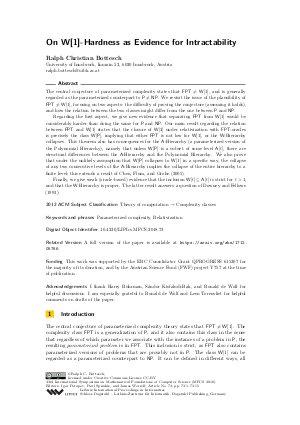On W[1]-Hardness as Evidence for Intractability
Author Ralph Christian Bottesch
-
Part of:
Volume:
43rd International Symposium on Mathematical Foundations of Computer Science (MFCS 2018)
Part of: Series: Leibniz International Proceedings in Informatics (LIPIcs)
Part of: Conference: Mathematical Foundations of Computer Science (MFCS) - License:
 Creative Commons Attribution 3.0 Unported license
Creative Commons Attribution 3.0 Unported license
- Publication Date: 2018-08-27
File

PDF
LIPIcs.MFCS.2018.73.pdf
- Filesize: 498 kB
- 15 pages
Document Identifiers
Related Versions
Subject Classification
ACM Subject Classification
- Theory of computation → Complexity classes
Keywords
- Parameterized complexity
- Relativization
Metrics
- Access Statistics
-
Total Accesses (updated on a weekly basis)
0PDF Downloads0Metadata Views
Abstract
The central conjecture of parameterized complexity states that FPT !=W[1], and is generally regarded as the parameterized counterpart to P !=NP. We revisit the issue of the plausibility of FPT !=W[1], focusing on two aspects: the difficulty of proving the conjecture (assuming it holds), and how the relation between the two classes might differ from the one between P and NP. Regarding the first aspect, we give new evidence that separating FPT from W[1] would be considerably harder than doing the same for P and NP. Our main result regarding the relation between FPT and W[1] states that the closure of W[1] under relativization with FPT-oracles is precisely the class W[P], implying that either FPT is not low for W[1], or the W-Hierarchy collapses. This theorem also has consequences for the A-Hierarchy (a parameterized version of the Polynomial Hierarchy), namely that unless W[P] is a subset of some level A[t], there are structural differences between the A-Hierarchy and the Polynomial Hierarchy. We also prove that under the unlikely assumption that W[P] collapses to W[1] in a specific way, the collapse of any two consecutive levels of the A-Hierarchy implies the collapse of the entire hierarchy to a finite level; this extends a result of Chen, Flum, and Grohe (2005). Finally, we give weak (oracle-based) evidence that the inclusion W[t]subseteqA[t] is strict for t>1, and that the W-Hierarchy is proper. The latter result answers a question of Downey and Fellows (1993).
Cite As Get BibTex
Ralph Christian Bottesch. On W[1]-Hardness as Evidence for Intractability. In 43rd International Symposium on Mathematical Foundations of Computer Science (MFCS 2018). Leibniz International Proceedings in Informatics (LIPIcs), Volume 117, pp. 73:1-73:15, Schloss Dagstuhl – Leibniz-Zentrum für Informatik (2018)
https://doi.org/10.4230/LIPIcs.MFCS.2018.73
BibTex
@InProceedings{bottesch:LIPIcs.MFCS.2018.73,
author = {Bottesch, Ralph Christian},
title = {{On W\lbrack1\rbrack-Hardness as Evidence for Intractability}},
booktitle = {43rd International Symposium on Mathematical Foundations of Computer Science (MFCS 2018)},
pages = {73:1--73:15},
series = {Leibniz International Proceedings in Informatics (LIPIcs)},
ISBN = {978-3-95977-086-6},
ISSN = {1868-8969},
year = {2018},
volume = {117},
editor = {Potapov, Igor and Spirakis, Paul and Worrell, James},
publisher = {Schloss Dagstuhl -- Leibniz-Zentrum f{\"u}r Informatik},
address = {Dagstuhl, Germany},
URL = {https://drops.dagstuhl.de/entities/document/10.4230/LIPIcs.MFCS.2018.73},
URN = {urn:nbn:de:0030-drops-96559},
doi = {10.4230/LIPIcs.MFCS.2018.73},
annote = {Keywords: Parameterized complexity, Relativization}
}
Author Details
Funding
This work was supported by the ERC Consolidator Grant QPROGRESS 615307 for the majority of its duration, and by the Austrian Science Fund (FWF) project Y757 at the time of publication.
References
-
E. Allender. Limitations of the upward separation technique. Mathematical Systems Theory, 24(1):53-67, 1991.

-
S. Arora and B. Barak. Computational Complexity: A Modern Approach. Cambridge, 2009.

-
R.V. Book, C.B. Wilson, and M. Xu. Relativizing time, space, and time-space. SIAM J. Comput., 11(3):571-581, 1982.

- R.C. Bottesch. Relativization and Interactive Proof Systems in Parameterized Complexity Theory. In 12th International Symposium on Parameterized and Exact Computation (IPEC 2017), volume 89, pages 9:1-9:12, 2018. URL: http://drops.dagstuhl.de/opus/volltexte/2018/8571.
-
J.F. Buss and T. Islam. Simplifying the Weft hierarchy. Theoretical Computer Science, 351(3):303-313, 2006.

-
L. Cai, J. Chen, R.G. Downey, and M.R. Fellows. On the structure of parameterized problems in NP. Information and Computation, 123:38-49, 1995.

-
Y. Chen, J. Flum, and M. Grohe. Machine-based methods in parameterized complexity theory. Theoretical Computer Science, 339:167-199, 2005.

-
R.G. Downey and M.R. Fellows. Fixed-parameter tractability and completeness III - Some structural aspects of the W hierarchy. In K. Ambos-Spies, S. Homer, and U. Schoning, editors, Complexity Theory, pages 166-191. Cambridge University Press, 1993.

-
R.G. Downey and M.R. Fellows. Parameterized Complexity. Springer, Berlin, 1999.

-
R.G. Downey and M.R. Fellows. Fundamentals of Parameterized Complexity. Springer, 2013.

-
J. Flum and M. Grohe. Parameterized Complexity Theory. Springer, Berlin, 2006.

-
L. Fortnow and M. Sipser. Are there interactive protocols for co-NP languages? Information Processing Letters, 28(5):249-251, 1988.

-
R. Imagliazzo, R. Paturi, and F. Zane. Which problems have strongly exponential complexity? Journal of Computer and System Sciences, 63(4):512-530, 2001.

-
D. Lokshtanov, D. Marx, and S. Saurabh. Lower bounds based on the exponential time hypothesis. Bulletin of the EATCS, 105:41-71, 2011.

-
C.H. Papadimitriou. Computational Complexity. Addison-Wesley, 1994.

-
A. Shamir. IP = PSPACE. J. ACM, 39(4):869-877, 1992.

